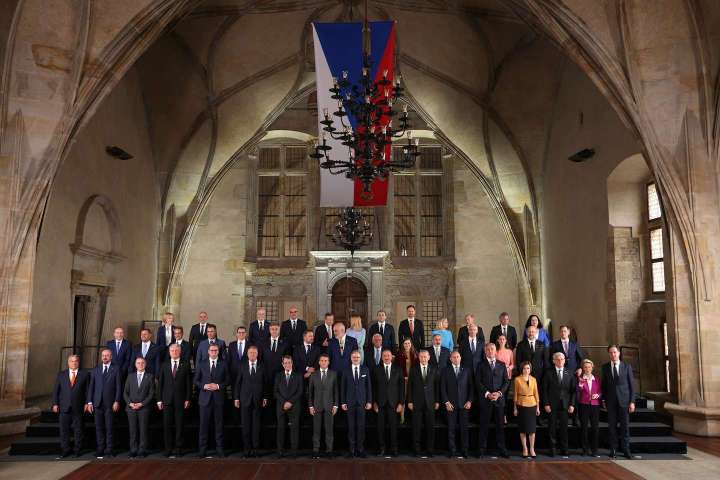PRAGUE — When French President Emmanuel Macron proposed the idea of a “European Political Community,” bridging the European Union and an outer circle of like-minded democracies, he was met with skepticism. Ukrainian leaders said they wanted full E.U. membership and not second-class status. British leaders said they didn’t want to reenter the entanglements they had just extracted themselves from. Political commentators chided Macron, saying he was again seeking to become the leader of Europe.
Macron’s European Political Community brings in skeptical Ukraine and U.K.

And yet Macron’s vision was realized Thursday, at least symbolically, as the leaders from the 27 E.U. member states joined the delegations from 17 non-E.U. countries at Prague Castle. The gathering included representatives from most countries on the continent, with the exception of Russia and Belarus.
Ukrainian President Volodymyr Zelensky, in a speech delivered via video link, said the new group offered “not just another for format of cooperation in Europe but an extremely powerful opportunity to restore peace in Europe.”
While arguing for sustained support for his country, Zelensky framed Russian aggression as an attack on Europe and its values.
“This is the Russian formula for war: kill, intimidate, fix threats to free states and their losses, destroy borders and corrupt,” he said. “And each of these elements is anti-European. All of them are directed against Europe.”
The E.U. granted Ukraine candidate status in June. But the process typically takes years. A prospective member’s entire body of laws must be picked over and brought into compliance with standards set in Brussels. And Ukraine must prove that it has moved beyond a political record marred by corruption.
Also addressing the Prague gathering was new British prime minister Liz Truss, who had been among the skeptics of the European Political Community but wrote in a Times op-ed that “it is right that we find common cause with our European friends and allies.”
Truss, a staunch defender of Brexit, insisted that Britain wasn’t about to resume the relationship with Europe it had before the divorce.
“Today’s meeting is not an EU construct or an EU alternative,” she wrote. “It brings together governments from across Europe, around a third of whom are outside the EU. A post-Brexit Britain, as an independent country outside the EU, should be involved in discussions that affect the entire continent and all of us here at home. We are taking part as an independent sovereign nation, and we will act as one.”
In Prague, Truss spoke about the need to for Europe to “continue to stand firm — to ensure that Ukraine wins this war but also to deal with the strategic challenges that it has exposed.”
During her leadership campaign, Truss had provoked French anger by saying “the jury is still out” on whether Macron counts as a “friend or foe.” Asked about it by journalists on Thursday, Truss confirmed she considered him a “friend.”
Macron first floated his idea for the European Political Community during a speech to the European Parliament in May.
“This new European organization would allow democratic European nations that subscribe to our shared core values to find a new space,” he said, citing possible joint projects in the energy, security or infrastructure sectors but also politically sensitive issues such as the free movement of people.
Some analysts have suggested that the proposal is rooted French resistance to enlarging the E.U. — and might be used to sideline aspiring members. In 2019, Macron’s government vetoed the opening of membership talks with Albania and North Macedonia, arguing that deeper cooperation within the bloc should take priority over expansion. The French president has also criticized the E.U. membership process for being “irreversible” and for a “bizarre” sequence that bestows benefits such as free movement within the E.U. before membership negotiations truly begin.
At the same time, Macron has been a vocal defender of the European project and regularly speaks about “European values” — to counter far-right nationalism and illiberal tendencies within the E.U., as well as external threats.
He has regularly positioned himself as the voice of Europe. And he has more room to maneuver since Britain’s exit from the E.U. and the retirement of longtime German chancellor Angela Merkel, who greeted his sweeping proposals for E.U. changes in 2019 with a shrug.
In April, Macron was reelected for another five-year term as head of the E.U.’s second-biggest economy.
But some question whether Macron has the political capital to bring European countries together in more than a symbolic way. The war in Ukraine has boosted his argument that Europe should become a “fully sovereign” bloc of nations. But Macron’s past efforts at rapprochement with Russia, and his willingness to keep talking to President Vladimir Putin even after the invasion, hurt the French leader’s reputation in parts of Europe.
Noack reported from Paris and Bellack from Washington.






